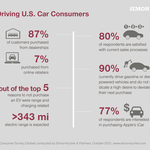While roughly half of all U.S. consumers express interest in electric vehicles and autonomous driving technology, there is also surprisingly high satisfaction with more traditional approaches.
- Vehicle purchase motivation
- Data sharing with the manufacturers
- Consumer views on in-car advertising
- Purchase motivation for Electric Vehicles (EV)
- Consumer views on autonomous driving
BOSTON–(BUSINESS WIRE)–As the automotive industry continues to innovate, U.S. consumer attitudes are shifting toward increasing openness to data sharing, new mobility concepts, and alternative manufacturing markets. These are the findings from global consulting firm Simon-Kucher & Partners’ Automotive Consumer Survey 2022*, covering 1,529 U.S. consumers as part of a global study that reached 10,000 consumers across 14 markets. However, the study also highlighted that many still prioritize conventional dealerships and purchasing models when it comes to their cars.
Unsurprisingly, a car’s price drives the purchasing decisions, ranking as the single most important purchase criterion for respondents. Price was followed by more value-based criteria, such as technology, brand, and design. When making a purchase, conventional dealerships still come out on top. Eighty-seven percent of customers still prefer car dealerships, with 75 percent identifying the test drive as a key priority. Additionally, 80 percent of respondents reported satisfaction with the current sales processes; while with negotiation being the number one reason for dissatisfaction, it is also important to 69 percent to be able to do so, to get better pricing.
Consumers cautiously open to data sharing
When it comes to either data sharing or in-car advertisements, attitudes are slowly shifting. Approximately 2/3 of respondents were open to some form of data sharing, especially regarding vehicle data (e.g., fuel consumption and technical conditions) rather than personal data (e.g., destination). A majority of the respondents (60 percent) are willing to share personal data based on varied levels of compensation and restrictions.
There was more hesitancy over in-car advertising: nearly half (49 percent) of Americans are opposed altogether. Only 25 percent of all consumers were open to the idea in some form, however, requested a discount or voucher in exchange.
Electric vehicles are gaining acceptance but will need to power up to boost sales.
While a key trend globally has been the increasing acceptance of EVs (Electric Vehicles), driven by sustainability concerns and fears of increasing regulatory restrictions on conventional vehicles, 90 percent of U.S. respondents currently drive gasoline or diesel-powered vehicles and will consider a gas-powered vehicle for a new-car purchase.
Price, range, and charging infrastructure were the key reasons given by respondents for not considering an EV. On average, respondents expect a driving range of over 343 miles (552 km).
Dylan Grien, Manager at Simon-Kucher, commented:
“It is clear to us that the future of the automotive industry is electric, but consumer sentiment indicates that this transition will be measured, dependent upon (among other factors) the proliferation of supporting infrastructure and the advancement of battery technology”
Autonomous driving technology gaining traction
Reactions to autonomous driving technology remain mixed. Forty-five percent of respondents indicated excitement about the technology, while 32 percent admitted fear of autonomous technology. System malfunctions, failure to react to human behavior, and the possibility of the car being hacked or externally controlled were the top concerns.
Though the overall view is that autonomous technology is a positive move technologically and will become standard in the coming years, most respondents strongly perceived autonomous vehicles as a luxury and believe they will be too expensive.
Will Lee, Senior Manager at Simon-Kucher, commented:
“Consumer acceptance of fully autonomous driving technology will depend on building their inherent trust in the vehicle itself. Building this trust will require a crawl, walk, run strategy. Consumers must first feel comfortable with advanced driver assistance systems (ADAS) such as automatic emergency braking and adaptive cruise control, which are becoming more common in new vehicles. Consumers who already have ADAS will be more likely to accept the next phase, which is partial autonomous driving technology such as hands-free highway driving assist. These consumers will then have a clearer path to accepting fully autonomous driving technology.”
Look to early adopters for market direction
The study identified three consumer segments in the market, based on their opinions on EVs, autonomous driving and other innovative technologies: Early Adopters, Mainstream Progressists and Traditionalists. While revealing significantly more enthusiasm for all modern technologies, Early Adopters also appeared more brand-agnostic and value-driven in their purchasing criteria. Keeping a close eye on changing opinions and behavior in this customer segment can provide clues for where the market will develop next.
Peter Harms, Partner at Simon-Kucher, commented:
“The automotive industry is at an inflection point, but a boom in electric vehicles and autonomous driving technology is only as strong as the associated consumer demand. In our study, we look at the future of the automotive industry from the eyes of the car buyer, so that automakers can best understand how to properly monetize their innovations.”
Study available for download here
*About the study: The Automotive Consumer Survey (Global) was conducted by Simon-Kucher & Partners in October 2021. Almost 10,000 car customers from across 14 countries (Australia, Belgium, China, Denmark, France, Germany, Italy, Japan, Mexico, Norway, Spain, Sweden, UK, and US) were surveyed about their product and purchase preferences, and attitudes towards new mobility concepts. This study was led by a group of experts from Simon-Kucher’s global Automotive practice.
Simon-Kucher & Partners, Strategy & Marketing Consultants:
Simon-Kucher & Partners is a global consulting firm with more than 1,600 professionals in 42 offices worldwide focusing on TopLine Power®. Founded in 1985, the company has over 35 years of experience providing strategy and marketing consulting and is regarded as the world’s leading pricing advisor.
Contacts
For more information, please contact:
Laurel Pea
laurel.pea@simon-kucher.com
www.simon-kucher.com






